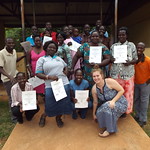With funding from Disability Rights Fun for capacity building Gulu Women with Disability Union, GDPU’s sister organization whom we share a compound with, held an Advocacy and Partnership training. The training was facilitated by UN High Commission on Human Rights (OHCHR).
While the first day of the training covered the material of the average undergrad human rights course, it was hearing the issues and context from the outspoken and fierce Board Members of GOWUDU the stood out significantly. As the facilitators were broad on rights, the Chairman of the Board brought the facilitators back to the grassroots level they work on. For GOWUDU staff and board having human rights is all well and good, but in a culture where formally children born with disabilities were “thrown into water,” getting the community to see the child as a human, and an equal is a difficult task. As the facilitators asked, “why do we have rights?” A board member quite gracefully responded “We are the same. The same process that bore me, bore you [translation].” As the GDPU Chairman, Teddy states, “how do you expect outsiders to treat you if your own parents think you are a curse?”
The second day of the training was extremely practical and thought provoking on how advocacy works. The OHCHR split all participants into groups of three using case studies. We were to take the case study through the process explained on the first day of training. The process started in understanding problems, choosing a problem to advocate for, then coming up with an advocacy plan. My group consisted of both GDPU’s Chairman, GOWODU’s Chairman, and a GOWODU board member. Through working within the group I realized one of the biggest weaknesses is the lack of ability to focus in on one issue. It’s true within the case study, as well as, in their work there are A LOT of problems. However, to make a strong case in advocacy it’s better to stick to one concise problems with well thought out solutions.
Another of the largest take-aways is often the lack of clear planning that happens before advocacy meetings. Before going in we should know exactly what change we want, a clear change. It’s not awareness raising or dialogue, that’s not advocacy.
Posted By Kathryn Dutile (Uganda)
Posted Oct 7th, 2014


